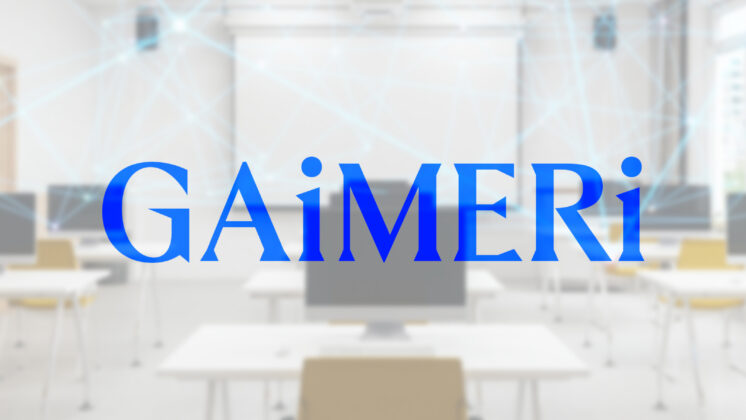When ChatGPT was launched on November 30, 2022, few could have predicted the profound impact it would have across industries. Over a year later, an ongoing debate remains on the benefits and drawbacks of relying on generative AI in the higher education sector.
The GLOBIS AI Management Education Research Institute (GAiMERi) is working on ways to enhance the learning experience through AI-based technology while also ensuring the information provided meets academic standards.
Insights staff sat down with YuanHung Kuo, the product manager of GAiMERi, to explore the technological possibilities of AI in education.
Insights Staff: Can you explain your project at GLOBIS?
Kuo: GAiMERi is a research-based team focused on taking the output from our research and incorporating it into GLOBIS products and workflows.
The research themes are mainly threefold. The first is the accumulation, visualization, analysis, and evaluation of learning data. The second is the optimization of GLOBIS-like interactive and descriptive learning processes and teaching methods, represented by the case method, through AI. The third is working on the high-quality and labor-saving transformation of existing tasks with the support of AI, exemplified by the evaluation support for reports and entrance examination essays.
Since 2024, we have slightly organized our projects into two directions: OFFENSE & DEFENSE. For the Offense aspect, we place emphasis on new services that enhance student learning engagement by understanding student learning behaviors to provide personalized learning experience with AI. On the Defense aspect, we incorporate AI into the existing work flow to improve the efficiency within GLOBIS teams.
Next Article
Why Companies Need Sustainable Technology for a Sustainable Future
Insights Staff: AI is a buzzword now, but can you clarify what are the parameters for something to be considered AI?
Kuo: In my opinion, there are three things that make AI, AI…
- AI should be able to learn and improve on its own performance through observations and feedback.
- AI should have the ability to reason, problem solve, make decisions, and adapt to new situations by applying logical processes. It should be able to deduct new information from known facts.
- AI should be able to perceive. It should be able to use sight and sound, process them, and then understand the environment based on those perceptions.
Insights Staff: What are some of the challenges you are facing?
Kuo: Introducing AI into a well-established sector, like the MBA, requires a lot of insight from experts to help us understand issues within the industry that AI can solve. We are bringing in data scientists, lecturers, and people with other expertise to help us understand these issues.
We’re also using the GLOBIS dictionary to fine-tune our own chatbots. It’s half human, half AI work. Employees must explain to ChatGPT what words like kokorozashi and techovate mean, which in turn helps ChatGPT utilize these words correctly in its responses to users.
Insights Staff: What is the biggest driver in pushing this kind of technological change in education? (market competition, government subsidies, etc.)
Kuo: I started working in AI years ago, back when little people were really paying attention to it. At the time infrastructures such as GPUs were well-developed, so people started incorporating deep learning tech into their workflows.
At first, AI was only used to solve a single specific problem, but everything changed in 2022 when ChatGPT was born. Now, AI is so much more approachable and accessible, so everyone is jumping on it, trying to find every way they can to implement AI into their jobs.
Next Article
The Future of Remote Working: Collaboration with Technology
Insights Staff: Do you think COVID played a big role in speeding up the adoption of e-learning practices?
Kuo: Definitely. COVID changed education. People are more used to e-learning and using tech like online meetings, etc. This is the new standard, so there’s no going back now.
Insights Staff: What potential do you see for AI in education in the next 5 years?
Kuo: At GLOBIS, we already use case methods as an analog simulation for our students to learn from.
Virtual classroom
Eventually, I think we’ll see AI teachers and AI classmates, with classes personally tailored for each student.
Imagine a future where a student is the only human in the classroom, and the other students are AI. We’re currently experimenting on a “case-metaverse.“
As a student, you would be completely immersed in this game world, and you would have to solve these business problems in an AI-simulation. This will increase immersion and engagement compared to how students solve case studies now.
Virtual case-study characters.
Virtual classes could be tailored to a student’s personal preferences. Most global students are online anyway—they’re not learning in the same physical space, they’re in different time zones, etc., so it’s difficult to get people together at the same time to hold discussions.
It’s best to have conversations with real people, but if other people don’t have time, or are solo studying, AI students could be a supplementary option.
Students would have anytime access to these AI facilitators to help them out with their study sessions.
Next Article
How to Reshape Education for the Technovate Era
Insights Staff: What ethical considerations come into play when developing a generative AI language model, and the implementation of the model, specifically to be used in the education sector?
Kuo: There’s a lot that goes into it. A lot of debate on how much people can rely on AI. There’s a risk of people over relying on technology, and this can actually harm rather than help a student’s ability to develop their own critical thinking skills.
It would be great for students to help improve their output, but not for everything.
The most important thing is for students to think about how to apply what they’ve learned. AI should be used as a tool for getting the most out of their studies, not as a way to avoid doing the work themselves.






